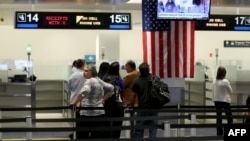The United States Thursday tightened its Visa Waiver Program, ending easy access to the U.S. for travelers who have been in Iran, Iraq, Sudan or Syria in the last five years, as well as for citizens of those four countries.
The changes in the Visa Waiver Program were enacted by Congress late last year and signed into law by President Barack Obama.
The implementation of the new regulations Thursday comes as the U.S. ramps up its border security in the wake of the Paris terrorist attacks that killed 130 people in November and a December assault in San Bernardino, California, that left 14 dead. The U.S. attack was carried out by an Islamist American and his Pakistani wife, who was cleared to enter the U.S. on a fiancee visa with the promise that she would soon get married.
Under the new rules, those traveling from Iran, Iraq, Sudan or Syria who previously were able to secure visa waivers may still be able to enter the U.S. by obtaining a visa through the regular immigration process at U.S. embassies or consulates, or if the U.S. determines on a case-by-case basis that there is a special reason why they should be allowed into the U.S.
The U.S. Homeland Security agency said it does not expect that "the great majority" of travelers to the U.S. using the Visa Waiver Program will be affected by the new rules. The program allows travelers from 38 countries to enter the U.S. without a visa and stay for up to 90 days.
It is estimated that about 20 million visitors come to the U.S. each year under the Visa Waiver Program.




